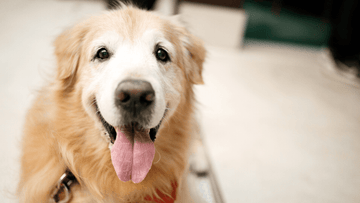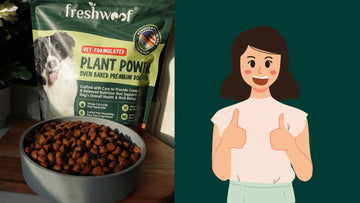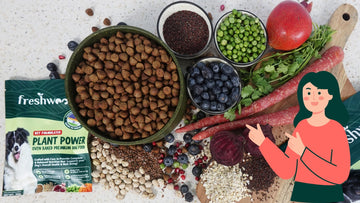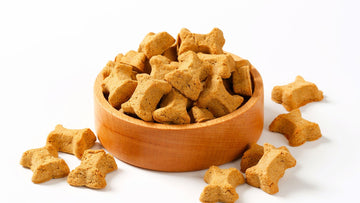Caring for an older dog requires special attention to any of their existing healthcare conditions, but most especially on their nutrition. When a beloved fur baby ages, their eating habits and dietary needs can change.
At what age is a dog considered senior or geriatric?
It depends on the breed, size, and bodyweight of the dog. Large and giant breeds age faster than smaller dogs and in addition to the breed making a difference, overweight dogs also age faster than lean dogs. In general, little dogs live to about 15 to 20 years of age, while bigger dogs live to about 12 to 15 years on average. Bigger dogs are considered older at around seven or eight years, and smaller dogs become older at around nine or ten. Although many dogs are very healthy even when they reach these age ranges. A pet might face these various problems as they age, including:
- Vision problems
- Lumps and other skin issues
- Weight loss or gain
- Joint problems
- Bad breath, excessive drooling, or other dental symptoms
- Difficulty in standing or walking for a longer period long time
It is important to learn that there is a difference between “aging” and "geriatric." When you’re your dog’s veterinary doctor talking about geriatric dogs, they are usually referring to the end of the senior period of your dog. Most will show some signs of aging like the above but few may also show more severe symptoms, including:
- Memory loss
- Altered behavior (confusion, irritability, or other personality changes
- Difficulties following their normal sleep patterns;
- Loss of muscle mass
- Increased urination (which could indicate kidney disease) or urinary incontinence
- Osteoarthritis
- Impaired mobility
Keep an eye on your dog for these signs as they enter their golden years. Visit the vet for their regular checkups at least twice a year for physical exams and blood work to help detect any internal issues. Consult a nutritionist when it comes to senior dogs and nutrition and evaluate what changes can be made in your dog’s diet to gain maximum benefit.
Does a senior dog have different nutritional needs than an adult?
Certainly, they have, but there's no regulation of dog foods claiming to cater to seniors, which creates a lot of confusion. However, some dietary changes can be made that can help manage the physical and mental changes your dog may go through. Some senior dogs do not specifically need any type of change in the nutrient composition of their diet but making a few nutritional adjustments as mentioned below for senior dogs is always beneficial. Remember to talk to your vet before making any changes to your dog’s diet.
Protein: Older dogs may require more protein in their diet as the protein stores of a senior dog turn over more rapidly than in younger dogs, and like humans, dogs can start to lose muscle mass as they age.
Fat: Some senior dogs may require higher or lower fat in their food. If your dog is dropping his weight, the first thing you do is to consult your vet about any underlying medical condition that might affect his/her appetite, calorie needs, or digestion. If your dog is losing her/his muscle mass, increasing the protein content of the diet is critical. However, if your dog is getting thinner because of any other reason, your vet might recommend a diet higher in fat. On the other hand, if your senior buddy is struggling with obesity or is overweight, the vet will recommend a diet lower in fat content.
Fiber: For those senior dogs who suffer from constipation or even loose stools, the fiber becomes very important to ease the bowel movement and to keep your pooch regular.
Calories: How many calories a senior dog need? Well, the answer to this question is a bit complicated. Whether to increase the calories or to decrease it depends on whether your dog needs to gain weight or shed some of the KGs. Lower-calorie foods are often recommended because senior dogs tend to be less active than their younger counterparts. In fact, dogs' activity levels tend to drop by as much as one-third to one-half as they age. However, every dog is different and so are their needs. So, always consult your vet, who can help you determine what is right for your dog and make adjustments accordingly.
After puppyhood, old age is the most important time to add supplements to your dog’s diet. Adding these supplements will give the body extra nutrients it needs to prevent certain kinds of health issues.
Joint supplements: Dogs are more likely to develop arthritis as they age, especially if they are overweight or obese. Joint care is essential to remember more than ever in this life stage. If the dog starts to present with creaky joints then the cartilage is showing signs of age due to depletion of essential glucosamine and chondroitin. Adding omega-3 fatty acids EPA and DHA have been shown to reduce inflammation and aid in arthritis.
Digestive enzyme supplements: Digestive enzymes are a good idea from the point of middle age onwards. Older dogs produce fewer enzymes as they age, and may also benefit from the addition of digestive enzyme supplements. Just like for humans, digestive enzymes for dogs act as catalysts and speed up specific, life-preserving chemical reactions in the body. They also play a crucial role in nutrient absorption.
Antioxidants: Feed your dog foods like blueberries, strawberries, dark green veggies, raspberries, beans, and whole grains which are high in antioxidants. Antioxidants scavenge free radicals from the body cells and prevent or reduce the damage caused by oxidation.
Avoid kibbles or foods that may stain your dog’s teeth
Breaking through kibble can be tough for senior dogs as many face dental issues and loose teeth during this stage of life. Switching to soft food will help your dog a lot.
Does my dog need senior dog food?
It is important to evaluate your dog before making adjustments to his diet because every dog is different and so are their nutritional needs. Just because your dog is a senior does not mean he needs senior dog food. Many 'adult' or 'all life stages' dog foods may be as or even more beneficial than diets marketed for seniors. Your senior buddy can live a healthy life ahead while being on his adult dog food and making a few nutritional adjustments here and there with the consultation of the vet.





